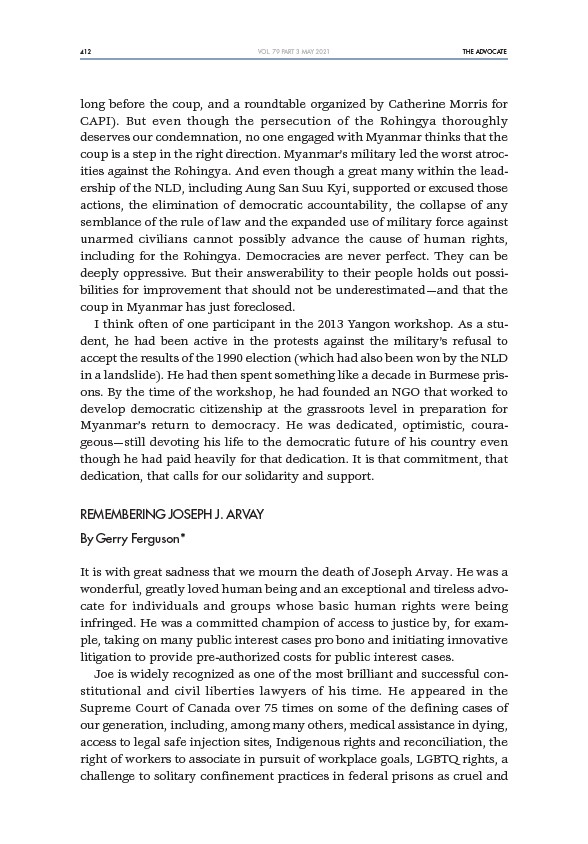
412 THE ADVOCATE
VOL. 79 PART 3 MAY 2021
long before the coup, and a roundtable organized by Catherine Morris for
CAPI). But even though the persecution of the Rohingya thoroughly
deserves our condemnation, no one engaged with Myanmar thinks that the
coup is a step in the right direction. Myanmar’s military led the worst atrocities
against the Rohingya. And even though a great many within the leadership
of the NLD, including Aung San Suu Kyi, supported or excused those
actions, the elimination of democratic accountability, the collapse of any
semblance of the rule of law and the expanded use of military force against
unarmed civilians cannot possibly advance the cause of human rights,
including for the Rohingya. Democracies are never perfect. They can be
deeply oppressive. But their answerability to their people holds out possibilities
for improvement that should not be underestimated—and that the
coup in Myanmar has just foreclosed.
I think often of one participant in the 2013 Yangon workshop. As a student,
he had been active in the protests against the military’s refusal to
accept the results of the 1990 election (which had also been won by the NLD
in a landslide). He had then spent something like a decade in Burmese prisons.
By the time of the workshop, he had founded an NGO that worked to
develop democratic citizenship at the grassroots level in preparation for
Myanmar’s return to democracy. He was dedicated, optimistic, courageous—
still devoting his life to the democratic future of his country even
though he had paid heavily for that dedication. It is that commitment, that
dedication, that calls for our solidarity and support.
REMEMBERING JOSEPH J. ARVAY
By Gerry Ferguson*
It is with great sadness that we mourn the death of Joseph Arvay. He was a
wonderful, greatly loved human being and an exceptional and tireless advocate
for individuals and groups whose basic human rights were being
infringed. He was a committed champion of access to justice by, for example,
taking on many public interest cases pro bono and initiating innovative
litigation to provide pre-authorized costs for public interest cases.
Joe is widely recognized as one of the most brilliant and successful constitutional
and civil liberties lawyers of his time. He appeared in the
Supreme Court of Canada over 75 times on some of the defining cases of
our generation, including, among many others, medical assistance in dying,
access to legal safe injection sites, Indigenous rights and reconciliation, the
right of workers to associate in pursuit of workplace goals, LGBTQ rights, a
challenge to solitary confinement practices in federal prisons as cruel and